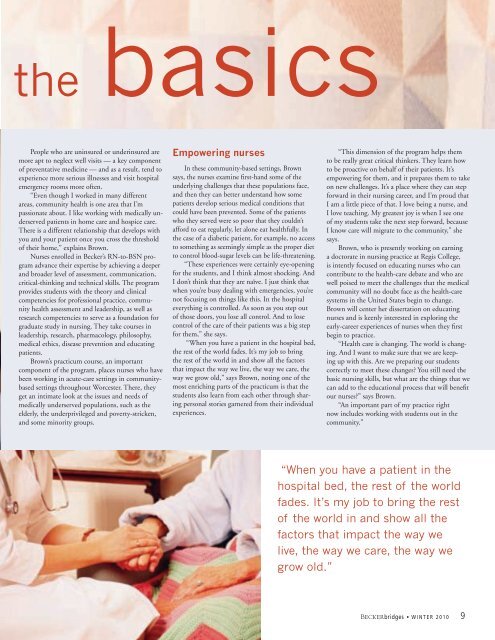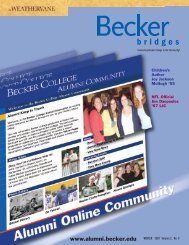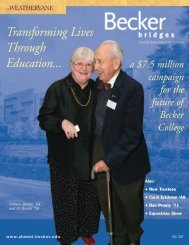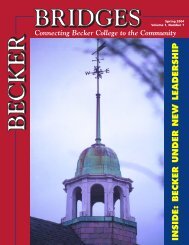You also want an ePaper? Increase the reach of your titles
YUMPU automatically turns print PDFs into web optimized ePapers that Google loves.
the basics<br />
People who are uninsured or underinsured are<br />
more apt to neglect well visits — a key component<br />
of preventative medicine — and as a result, tend to<br />
experience more serious illnesses and visit hospital<br />
emergency rooms more often.<br />
“Even though I worked in many different<br />
areas, community health is one area that I’m<br />
passionate about. I like working with medically underserved<br />
patients in home care and hospice care.<br />
There is a different relationship that develops with<br />
you and your patient once you cross the threshold<br />
of their home,” explains Brown.<br />
Nurses enrolled in <strong>Becker</strong>’s RN-to-BSN program<br />
advance their expertise by achieving a deeper<br />
and broader level of assessment, communication,<br />
critical-thinking and technical skills. The program<br />
provides students with the theory and clinical<br />
competencies for professional practice, community<br />
health assessment and leadership, as well as<br />
research competencies to serve as a foundation for<br />
graduate study in nursing. They take courses in<br />
leadership, research, pharmacology, philosophy,<br />
medical ethics, disease prevention and educating<br />
patients.<br />
Brown’s practicum course, an important<br />
component of the program, places nurses who have<br />
been working in acute-care settings in communitybased<br />
settings throughout Worcester. There, they<br />
get an intimate look at the issues and needs of<br />
medically underserved populations, such as the<br />
elderly, the underprivileged and poverty-stricken,<br />
and some minority groups.<br />
Empowering nurses<br />
In these community-based settings, Brown<br />
says, the nurses examine fi rst-hand some of the<br />
underlying challenges that these populations face,<br />
and then they can better understand how some<br />
patients develop serious medical conditions that<br />
could have been prevented. Some of the patients<br />
who they served were so poor that they couldn’t<br />
afford to eat regularly, let alone eat healthfully. In<br />
the case of a diabetic patient, for example, no access<br />
to something as seemingly simple as the proper diet<br />
to control blood-sugar levels can be life-threatening.<br />
“These experiences were certainly eye-opening<br />
for the students, and I think almost shocking. And<br />
I don’t think that they are naïve. I just think that<br />
when you’re busy dealing with emergencies, you’re<br />
not focusing on things like this. In the hospital<br />
everything is controlled. As soon as you step out<br />
of those doors, you lose all control. And to lose<br />
control of the care of their patients was a big step<br />
for them,” she says.<br />
“When you have a patient in the hospital bed,<br />
the rest of the world fades. It’s my job to bring<br />
the rest of the world in and show all the factors<br />
that impact the way we live, the way we care, the<br />
way we grow old,” says Brown, noting one of the<br />
most enriching parts of the practicum is that the<br />
students also learn from each other through sharing<br />
personal stories garnered from their individual<br />
experiences.<br />
“This dimension of the program helps them<br />
to be really great critical thinkers. They learn how<br />
to be proactive on behalf of their patients. It’s<br />
empowering for them, and it prepares them to take<br />
on new challenges. It’s a place where they can step<br />
forward in their nursing career, and I’m proud that<br />
I am a little piece of that. I love being a nurse, and<br />
I love teaching. My greatest joy is when I see one<br />
of my students take the next step forward, because<br />
I know care will migrate to the community,” she<br />
says.<br />
Brown, who is presently working on earning<br />
a doctorate in nursing practice at Regis <strong>College</strong>,<br />
is intently focused on educating nurses who can<br />
contribute to the health-care debate and who are<br />
well poised to meet the challenges that the medical<br />
community will no doubt face as the health-care<br />
systems in the United States begin to change.<br />
Brown will center her dissertation on educating<br />
nurses and is keenly interested in exploring the<br />
early-career experiences of nurses when they fi rst<br />
begin to practice.<br />
“Health care is changing. The world is changing.<br />
And I want to make sure that we are keeping<br />
up with this. Are we preparing our students<br />
correctly to meet these changes? You still need the<br />
basic nursing skills, but what are the things that we<br />
can add to the educational process that will benefi t<br />
our nurses?” says Brown.<br />
“An important part of my practice right<br />
now includes working with students out in the<br />
community.”<br />
“When you have a patient in the<br />
hospital bed, the rest of the world<br />
fades. It’s my job to bring the rest<br />
of the world in and show all the<br />
factors that impact the way we<br />
live, the way we care, the way we<br />
grow old.”<br />
BECKERbridges WINTER <strong>2010</strong> 9






